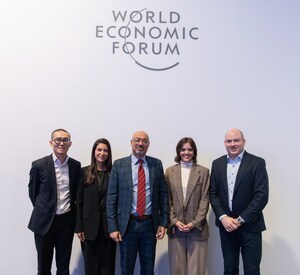IBM to Collaborate With Universities to Make Mobile Devices More Accessible
Could Help Make eGovernment Services and Economic Opportunity Available to More Populations
ARMONK, N.Y., March 10 /PRNewswire-FirstCall/ -- IBM (NYSE: IBM), the National Institute of Design (NID) of India and Research Center for Advanced Science and Technology, The University of Tokyo (RCAST) today announced a new collaborative research initiative to explore an open, common user interface platform for mobile devices, to make them easier to use for disadvantaged populations around the world.
(Logo: http://www.newscom.com/cgi-bin/prnh/20090416/IBMLOGO )
Software developed by IBM Research and the universities will be made available as open source, and other materials developed will be made publicly available, in order to allow governments and businesses around the world to take advantage of the technology. As the world's infrastructure becomes increasingly digital and governments around the world provide information and services via Web sites, it's critical that the Internet be accessible to all people, including those who are illiterate, blind, deaf, or elderly. The aim of the collaborative research is to help make this possible.
The new research partnership is part of the IBM's Open Collaborative Research program, an initiative to foster innovation through university-industry research collaboration. RCAST is the first university affiliated research institute in Japan to participate in the Open Collaborative Research program, and NID is the second university in India.
"Through this collaborative research initiative, we will uncover real information accessibility requirements and issues that the elderly and people in developing economies are facing today," said Chieko Asakawa, IBM Fellow and chief technology officer of IBM's accessibility research. "By focusing on mobile devices, which have a tremendous potential to empower them, we believe the findings will help us offer affordable services to a large population, who are still deprived of access to key information sources."
Mobile phones have had phenomenal penetration globally. Low cost of ownership and a simple user interface contribute to the success of mobile phones with the less literate. However, apart from basic voice communication, illiterate populations are not able to exploit the benefits of information and services available to Internet users. IBM Research - India and NID will identify the communication needs and preferences of the non- and semi-literate population, to not only help them connect but to engage with information through mobile devices.
"By bringing IBM's deep knowledge in mobile web and NID's interface design and ethnological expertise, this initiative is aimed to develop inclusive technologies and help the underprivileged improve their lives," said Dr. Jignesh Khakhar of NID.
IBM researchers in Tokyo and the human information engineering research team, led by Professor Tohru Ifukube of RCAST, will place their research focus on Japan's elderly population, where the aging rate is growing at a rapid pace, making Japan the world's most elderly population. With IBM's accessibility technology expertise and RCAST's expertise, they will work directly with the elderly to investigate and determine real-life requirements of elderly people when using mobile devices.
"New technologies and various new services will continue to emerge, and mobile devices will become a window of opportunity for us to engage with information anytime anyplace," said Professor Tohru Ifukube of RCAST. "With IBM's expertise in accessibility technologies and mobile web technologies, coupled with our expertise in five-senses communication and NID's interface design expertise, we are looking forward to develop inclusive technologies for elderly population to help improve quality of life."
In 2009, IBM was recognized with India's National Award in the category of "Technological Innovation" for best applied research aimed at improving the life of persons with disabilities - India's highest such award. It recognized the work of IBM Researchers in creating technology for what IBM calls the "Spoken Web." This voice-enabled technology, developed by IBM Research - India, complements the Internet, and enables people with little or no literacy, or those with visual impairment, to access and share information, perform business transactions, and create social networks using mobile or landline phones. IBM was also recognized with the 2009 Helen Keller Award from India's National Centre for Promotion of Employment for Disabled People. The honor lauded IBM for demonstrating policies and practices that provide equal employment opportunities for people with disabilities. IBM has earned these significant awards for three years in a row.
IBM has a distinguished history in developing accessibility technology. The company developed a Braille printer in 1975 and a talking typewriter for the blind in 1980. More recently, IBM created the Home Page Reader, a browser that narrates Web content. In 2008, IBM earned the Helen Keller Achievement Award in Accessibility from the American Foundation for the Blind.
About IBM
For an additional perspective, visit http://asmarterplanet.com
For more information about the Open Collaborative Research program, visit https://www.ibm.com/developerworks/university/collaborativeresearch/index.html
For more information about IBM's mobile web initiative, visit http://www-03.ibm.com/press/us/en/presskit/24254.wss
About the National Institute of Design
The National Institute of Design (NID) is internationally acclaimed as one of the foremost multi-disciplinary institutions in the field of design education and research. The institute functions as an autonomous body under the department of Industrial Policy & Promotion, Ministry of Commerce & Industry, Government of India. NID is recognised by the Dept. of Scientific & Industrial Research (DSIR) under Ministry of Science & Technology, Government of India, as a scientific and industrial design research organisation.
NID has been a pioneer in industrial design education after Bauhaus and Ulm in Germany and is known for its pursuit of design excellence to make Designed in India, Made for the World a reality. NID's graduates have made a mark in key sectors of commerce, industry and social development by taking role of catalysts and through thought leadership
For more information, please visit http://www.nid.edu/
About Research Center for Advanced Science and Technology, The University of Tokyo
Research Center for Advanced Science and Technology, The University of Tokyo (RCAST) was established in 1987 and was formally acknowledged as the 11th research institute of the University of Tokyo. Its mission is to contribute to the development of science and technology by expeditiously taking on new challenges arising from the advancement of science and changes in society thereby exploring new areas of advanced science and technology for humankind and society. It is known for its uniqueness of cross-disciplinary research, and human information engineering led by Professor Ifukube constitutes an important research domain of RCAST barrier free project, that challenges to get over various barriers in modern society.
For more information, please visit http://www.rcast.u-tokyo.ac.jp/en/
MEDIA CONTACT: |
|
Sarah Spencer |
|
IBM |
|
+1 917-472-3728 |
|
SOURCE IBM
WANT YOUR COMPANY'S NEWS FEATURED ON PRNEWSWIRE.COM?
Newsrooms &
Influencers
Digital Media
Outlets
Journalists
Opted In





Share this article